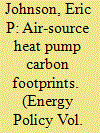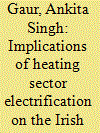|
|
|
Sort Order |
|
|
|
Items / Page
|
|
|
|
|
|
|
| Srl | Item |
| 1 |
ID:
103404


|
|
|
|
|
| Publication |
2011.
|
| Summary/Abstract |
European governments see that heat pumps could reduce carbon emissions in space- and hot-water heating. EU's Renewable Energy Directive designates heat pumps as renewable - eligible for various subsidies - if their carbon footprints are below an implied, average threshold. This threshold omits carbon generated by manufacture and emission of a heat-pump's fluorocarbon refrigerant. It also omits the footprint of the heat pump's hardware. To see if these omissions are significant, this study calculated carbon footprints of representative, residential heat pumps in the UK.
Three findings emerged. First, in relation to power generation, which accounts for most of a heat-pump's greenhouse-gas emissions, fluorocarbons add another 20% to the footprint. Second, at UK efficiencies a heat-pump footprint (in kg CO2e emitted per kWh delivered) is comparable or higher than footprints of gaseous fuels used in heating. It is lower than the footprint of heating oil and far lower than the footprints of solid fuels. Third, production and disposal of a heat pump's hardware is relatively insignificant, accounting for only 2-3% of the overall heat-pump footprint. Sensitivities to the results were assessed: key factors are footprint of electricity generation, F-gas composition and leak rates and type of wall construction.
|
|
|
|
|
|
|
|
|
|
|
|
|
|
|
|
| 2 |
ID:
109437


|
|
|
|
|
| Publication |
2011.
|
| Summary/Abstract |
The first aim of this paper is to shed light on the thermodynamic reasons for the practical pursuit of low temperature operation by engineers involved in the design and the operation of combined heat and power (CHP) and district heating (DH) systems. The paper shows that the steam cycle of a combined heat and power generator is thermodynamically equivalent to a conventional steam cycle generator plus an additional virtual steam cycle heat pump. This apparently novel conceptualisation leads directly to (i) the observed sensitivity of coefficient of performance of CHP to supply and return temperatures in associated DH systems, and (ii) the conclusion that the performance of CHP will tend to be significantly higher than real heat pumps operating at similar temperatures. The second aim, which is pursued more qualitatively, is to show that the thermodynamic performance advantages of CHP are consistent with the goal of deep, long-term decarbonisation of industrialised economies. As an example, estimates are presented, which suggest that CHP based on combined-cycle gas turbines with carbon capture and storage has the potential to reduce the carbon intensity of delivered heat by a factor of ~30, compared with a base case of natural gas-fired condensing boilers.
|
|
|
|
|
|
|
|
|
|
|
|
|
|
|
|
| 3 |
ID:
175893


|
|
|
|
|
| Summary/Abstract |
In this paper, we examine the electrification of the heating sector as a decarbonisation strategy, discuss its effectiveness, and preliminary assess its impact on the European power system. For this purpose, we perform a complete description of the EU heating sector compliant with official statistics and decompose the EU power demand in different uses to define and assess different levels of heat electrification. We find that heat electrification is an effective decarbonisation option, which can reduce the total energy related emissions by up to 17%, if paired with simultaneous expansion of low-carbon energy. Due to the relative sizes of heat and power demands, we find that most national power systems could cope with higher heat-electrification rates. Specifically, an additional heat pump capacity in the order of 1.1–1.6 TWth can be deployed based on the existing firm power capacity, which would correspond to a heat pump share of 29–45% in space heating. Based on their current power capacity, 12 Member States are prepared for even full electrification scenarios, whereas three Member States could get their power system stressed if 40–60% of all fossil-fuelled technologies are substituted. Flexible electric demand is identified as a key enabler of larger heat electrification shares.
|
|
|
|
|
|
|
|
|
|
|
|
|
|
|
|
| 4 |
ID:
171486


|
|
|
|
|
| Summary/Abstract |
In Europe, space and water heating account for approximately 80% of final energy use in the domestic sector. For many European countries the electrification of heat provision, via heat pumps (HPs), provides a promising decarbonisation pathway. The UK is no different, but recently concerns have been raised about the financial attractiveness of HPs given how, through various policy choices, taxes and levies are applied more heavily on electricity bills than gas bills. In this paper, we critically examine this argument by assessing the financial attractiveness of HPs across their lifetime for a typical UK household and within the current UK tax and regulatory regime. The results suggest taxes and levies do weaken the economic case for HPs: their current distribution having an unintended impact on the economics of HPs. Nonetheless, they are not the only reason for HPs comparative financial disadvantage. Upfront costs and HP performance, both influence the extent to which taxes and levies impact the economics of HPs. The results have implications for the future deployment of HPs in the UK and point towards policies to increase deployment (to drive down costs) and increase HP performance as being important.
|
|
|
|
|
|
|
|
|
|
|
|
|
|
|
|
| 5 |
ID:
186496


|
|
|
|
|
| Summary/Abstract |
Electrifying the heating sector, which is energy and carbon intensive, and shifting electricity supply to renewable technologies is one of the main policy options being pursued for decarbonisation of the heating sector. Heat pumps are widely adopted for this purpose. However, the impact of this policy on existing electrical systems, both from the perspectives of supply and demand, is understudied in the literature. This paper examines the system-wide impacts of integrating high quantities of heat pumps, in line with government targets, in Ireland. We provide a broad discussion of the ramifications of heating sector electrification in terms of system costs and expansion planning under renewable energy targets. Results reveal significant changes in generation and increases in associated costs with increasing levels of electrification. On the flip side, the heating sector electrification leads to more efficient utilisation of renewable energy and the transmission network. We also explore alternative policy pathways to minimize impacts on the system. These include determining optimal locations for heat pump integration and a technology-neutral emission reduction target. Optimal distribution of heat pumps has a low impact on system metrics whereas pursuing an emission reduction target makes a large impact on system costs.
|
|
|
|
|
|
|
|
|
|
|
|
|
|
|
|
| 6 |
ID:
192775


|
|
|
|
|
| Summary/Abstract |
While heat pumps are a promising solution for decarbonizing residential buildings, financial barriers often hinder their diffusion. Asset leasing – whereby service providers lease equipment and provide services in exchange for monthly payments – could help overcome some of the barriers to adoption. This study investigates homeowners' preferences for heat-pump leasing, examines their inclination to lease or purchase, and quantifies their willingness to pay for different services. Empirical insights are drawn from a discrete choice experiment conducted with 915 single-family house owners who undertook 9150 hypothetical leasing decisions in France, Germany, and Switzerland. Survey results show an interest in flexible, all-inclusive leasing offerings, especially in markets where heat pumps are at an early stage of diffusion. However, preferences for asset leasing differ between countries. German house owners are the most open to leasing and would on average be willing to pay up to three times more than their French counterparts to shield themselves against technical risk. Given the role asset leasing could play in decarbonizing residential heat and enhancing energy security, policy makers may wish to adapt policy incentives to account for these service-based offerings.
|
|
|
|
|
|
|
|
|
|
|
|
|
|
|
|
|
|
|
|
|